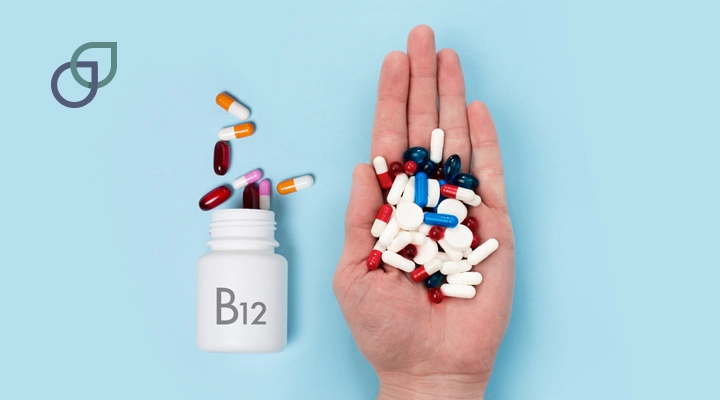Are you a fan of vitamin B12 for its energy-boosting perks? While this essential nutrient is crucial for our health, did you know excessive use of vitamin B12 can lead to unexpected consequences? If you don’t, let’s explore all about vitamin b12 overdose symptoms, risks, and steps to keep your B12 levels in check. Whether you’re a supplement enthusiast or simply curious about the B12 vitamin, understand how to stay safe while reaping the benefits of this vital vitamin.
Vitamin B12 Overdose: Symptoms and Side Effects
Vitamin B12 overdose occurs when someone takes too much of this vitamin, often from high-dose supplements or fortified foods. While B12 is important for blood cells, nerves, and DNA, excessive intake can lead to problems. B12 overdose symptoms include skin rashes, itching, upset stomach (nausea, vomiting, diarrhea), b12 overdose headache, and feeling anxious or nervous. Severe cases of b12 overdose level may cause high blood pressure or heart palpitations. Long-term risks are rare but may include nerve damage, leading to tingling, numbness, or weakness in limbs.
How Much Vitamin B12 Should You Take?
Determining the appropriate amount of vitamin B12 to take depends on several factors, including age, health status, and dietary habits. For instance, a 2.4 microgram daily intake is recommended for most adults.
What are the Symptoms of B12 Overdose?
Intake of vitamin b12 injection overdose can lead to several unpleasant symptoms, which may vary in severity depending on the level of overdose. Here are the B12 overdose symptoms:
- Skin rashes
- gastrointestinal issues (like nausea and diarrhea)
- Anxiety
- High blood pressure
- Heart palpitations.
What is the Treatment for High Vitamin B12?
The b12 overdose treatment depends on how severe the symptoms are and why the levels are high:
- Stop B12 supplements
- Adjust your diet
- Pay attention to signs and symptoms of b12 overdose
- Talk to a doctor or dietitian for personalized advice
- Treat underlying conditions
- Have regular blood tests
Vitamin B12 Dosage for Adults
For most adults, a daily intake of 2.4 micrograms of vitamin b12 interaction is sufficient. However, certain groups, such as older adults and vegans, may require supplements to meet their needs. You can further consult your healthcare professional to determine the appropriate dosage.
Possible Long-Term Risks of Vitamin B12
Does b12 give you energy right away? But do you know? excessive intake of vitamin B12 can potentially lead to nerve damage or disrupt the balance of other essential nutrients in the body. So, it’s better to monitor your intake and symptoms for long-term health.
When Should You See a Doctor?
If you experience unusual symptoms after taking B12 tablets or suspect an overdose, don’t hesitate to visit your physician for medical attention. When you get early intervention, it prevents any kind of complications.
How are Vitamin B12 Side Effects Treated?
Treatment depends on the specific b12 overdose symptoms. Mild reactions may resolve by discontinuing supplements, while severe symptoms may require medical intervention, such as supportive care or medication.
Frequently Asked Questions (FAQs)
- What does it mean if you have high vitamin B12 levels?
High vitamin B12 levels could mean you have kidney issues or leukemia. Besides, you’re taking too many supplements or eating lots of B12-rich foods.
- Is high levels of vitamin B12 a serious condition?
High vitamin B12 levels can indicate health issues but might not always be serious. In that case, you need to find out the cause with medical advice.
- How can I reduce the level of vitamin B12?
To lower vitamin B12 levels, stop taking B12 supplements, eat less B12-rich foods, and address any underlying health issues if needed.
- What happens if you overdose on vitamin b12?
Taking too much vitamin B12 can lead to skin rashes, digestive problems, anxiety, and heart palpitations.

